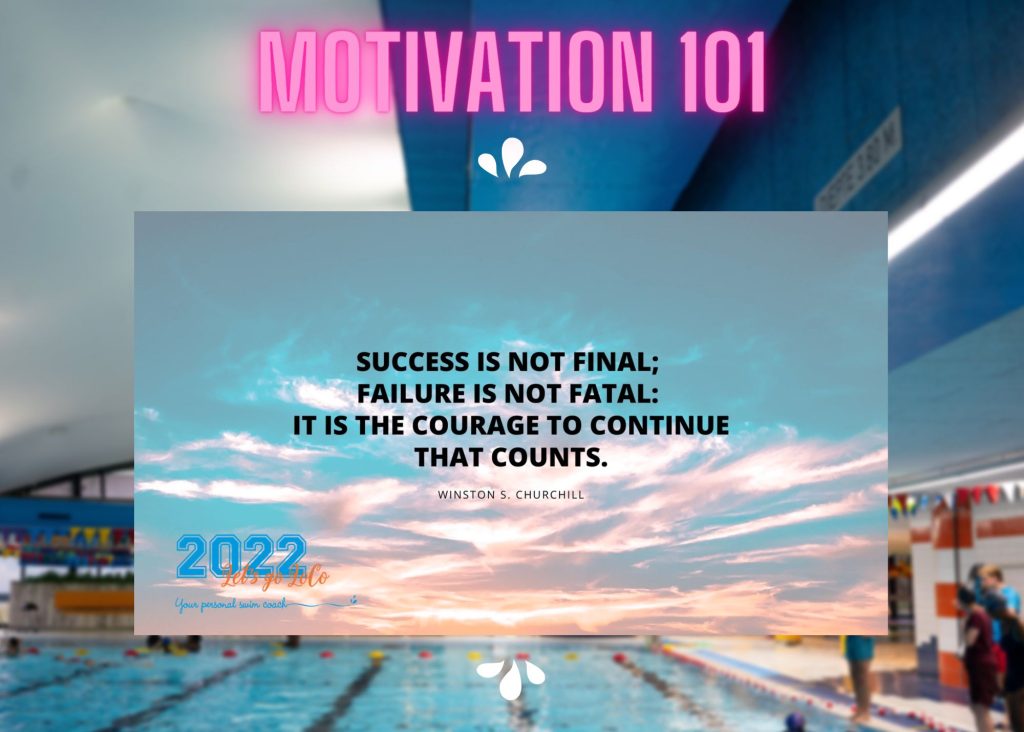Swimming is undeniably an essential tool, and you are probably familiarized with the idea already. Even though you know the many benefits of swimming and working out, you may still struggle to find motivation sometimes. In the following article, we will explore the best ways to keep ourselves on track and achieve our goals. This article will rely on interesting scientific papers and other third-party sources that you can access through the hyperlink.


The 7 key factors according to Mayo Clinic
Let’s make it simple. Sometimes information online can be very complex and hard to understand.
First: Experts recommend setting some simple and realistic goals. An example could be to expect yourself to learn a new movement or skill in a month or two. This will give you enough time to properly learn without getting frustrated. Remember that results may not be visible within the first few tries, but believe us, you will get there. Did you know about the science of goal setting? If you are interested in how to choose realistic goals and the science behind them, we recommend this article.
Second: Remember that having fun is also part of the process! Discovering your interests in swimming may be key: try watching documentaries about swimmers, learning more about the usefulness of swimming, or maybe get more involved with your coach when in class! Sport can definitely make you happy, and here is why.
Third: Swimming twice a week is ideal, yes but try to include other physical activities during the week. It could be going for a walk or choosing stairs over the elevator… research shows that long periods of inactivity may affect your health and psyche. It does not have to be intense cardio or GYM, but simple activities that help you stay active. Did you know that there is a strong compelling link between physical activity and your defense system? Read more about it here.
Fourth: Now that you set your goals… it is time to externalize them! It is a good idea to write down your goals on paper or even on your phone. This is a visual reminder to your brain and allows efficient recording and tracking of your progress. Did you feel frustrated when swimming? Write it down. Did you have an awesome day? Write it down too. Believe us, it helps! The importance of writing down your goals is explained by neuroscience.
Fifth: Keep in contact with your peers! You are never alone. Hundreds of other swimmers are in you same situation right now. Try to socialize as much as you can at the pool and outside the pool. Have you ever heard about our Facebook group for swimmers? We keep in touch and help each other be motivated there! We are also very active on our social media. Sport can also be an essential social institution.
Sixth: Make sure to reward yourself. Swimming can be hard and tiring sometimes. Maybe it would be a good idea to watch your favorite movie afterward or have your family cook you your favorite dinner as a prize. Think about what activities make you feel great, and try to use them as to-go routes when achieving your goals. This will help you ease the process, and enjoy it even more. Here are some ideas.
Seventh: Don’t be too harsh on yourself! Be flexible. If you are not feeling great, it is okay to skip one session. If you are too busy, it is okay to resolve pressing activities sometimes. Get it done, solve it, and take your time. Once you have relaxed more and regained your enthusiasm, systematically keep following your routine. Do not feel bad if you are not going as fast as you thought, everyone has a different pace. Building flexibility is key.
Summary:
| Setting some simple and realistic goals | E.g., learn a new skill in one month |
| Have fun | E.g., joke around with your peers! |
| Do more exercise | E.g., going for a walk |
| Write down your goals | E.g., use your tablet or phone to track progress |
| Keep in touch | E.g., join swimmers’ Facebook group |
| Reward yourself | E.g., cook your favorite meal at the end of the week |
| Do not be harsh on yourself | E.g., let yourself rest when needed |
Our final advice
Sports can be tiring, especially when you have little experience. We understand that it may be hard to find the motivation to attend lessons every week… but you must prioritize swimming!
Make a good schedule for the week, and make sure to include swimming in it. Try to find support in your peers, participate in the group chats and Facebook group, check out our social media, and talk to us! Our coaches will always be happy to give you the support you need in your journey, and they are trained to listen and provide you with the resources you need to keep swimming. Try to also move outside of swimming, try walking or doing some other sport to keep you active. All of this will help your brain to get used to the idea of prioritizing physical activity.
Lastly, do not be too harsh on yourself. If you have a bad day or are not feeling like doing anything, embrace those emotions and wait until you feel better and have regained some energy and enthusiasm.
In the meantime, we are always here to support you.
We are ready to continue the process! Are you?


Recent Comments